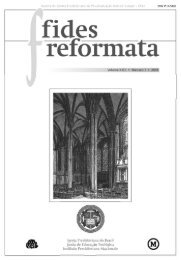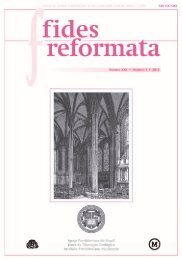Fides 22 N2
Um publicação do Centro Presbiteriano de Pós-graduação Andrew Jumper.
Um publicação do Centro Presbiteriano de Pós-graduação Andrew Jumper.
Create successful ePaper yourself
Turn your PDF publications into a flip-book with our unique Google optimized e-Paper software.
ELIAS MEDEIROS, THE REFORMERS AND MISSIONS<br />
He concludes: “Yet, when everything favourable has been said that can be said,<br />
and when all possible evidences from the writings of the Reformers have been<br />
collected, it all amounts to exceedingly little.” 64 Some phrases in this previous<br />
quote would surprise any researcher. Consider, for instance: “when everything<br />
favourable has been said,” or “when all possible evidences have been collected,”<br />
and “all amounts to exceedingly little.” 65 These statements ignore or at least<br />
diminish the relevance of the historical data (facts and texts).<br />
1. “During the period of the Reformation, there was little time for thought<br />
of missions [because] until 1648 the Protestants were fighting for their lives.”<br />
2. “Protestants everywhere wasted their strength, with honourable but<br />
blind and reckless zeal, in endless divisions and controversies.” Neill called<br />
it an “inner weakness.”<br />
3. “The Protestant powers [Holland, England, Germany] were not in touch<br />
with the wider world outside Europe.”<br />
4. “The Germans mostly stayed at home. And the geographical limitations<br />
were strongly reinforced by the psychological limitations of the concept of the<br />
regional church.”<br />
5. “The Protestants tended to say: “Missions are neither obligatory nor<br />
desirable, and our lack of them cannot be held against us as blindness or unfaithfulness.”<br />
The interesting words are simply the fruit of Neill’s interpretation<br />
of Lutheran theology, most of which is based on some of Johan Gerhard’s<br />
writings and a few passages of Luther’s commentaries. 66<br />
2.3 Kane, Winter, and Tucker: main arguments<br />
This section considers aspects of the life and work of historians Kane,<br />
Winter, and Tucker that are relevant to the subject. It includes analysis of<br />
their statements and reasoning about the reformers and mission, the sources<br />
they have used, how they use them, how they access and assess them, why<br />
they use those sources, and how their presupposed definition of terms affects<br />
their choice of sources and their interpretation of them in their writings on the<br />
reformers and missions.<br />
This section concludes by organizing what these historians have in common,<br />
how they relate to each other, and the strengths and weaknesses of their<br />
work. Consideration is given to who started the anti-Reformed movement<br />
concerning the reformers and missions and their immediate successors and to<br />
whether the historians reviewed in this research are correct in their interpretation<br />
(hermeneutics and exegesis) of even their selective sources and facts.<br />
64 Ibid.<br />
65 Neill comments, “Everything that can be said is carefully set out by H. W. Gensichen in his<br />
Missionsgeschichte der neueren Zeit (1961), pages 5-7.” (Neill, footnote 4, 189).<br />
66 Cf. Neill op. cit., 189; Warneck, op. cit., 28-32; and Verkuyl op. cit., 20.<br />
154




